With swimming finals of the 2016 Olympic Games set to take place at 10pm local time, athletes residing in places far away from host city Rio will encounter major time differentials, which include possibly not arriving in bed after finals until as late as 3am. Adjusting to such a time variation from athletes’ regular schedules has caused several countries to take counteractive measures, including holding specific Rio time zone preparation camps and altering the training and meet start times leading up to Rio.
Swimming Australia is taking even more measures to ensure that their team is the ‘most prepared’ squad on deck, procuring special sunglasses that regulate one’s biological clock. According to The Gold Coast Bulletin, Aussie Head Coach Jacco Verhaeren has ensured every swimmer and staff member is outfitted with special Propeaq sunglasses, a brand new product out of the Netherlands.
Priced at over $400 per pair, the glasses work with a mobile app to control and manage one’s biological clock based on which colored lenses and/or LED lights are used. For instance, the athletes may opt to wear the glasses on deck for finals between 10pm and midnight, with the glasses set to make the swimmers’ minds register it is day time when it is really night. The glasses also enable swimmers to convert to ‘night mode’, which can help the user fall asleep faster, which will come in useful with the big time zone differential.
According to propeaq.com, the app and glasses work together to regulate and optimize one’s personal performance and energy. “You will become more active, more alert and have great concentration and be more productive throughout the day,” the product’s site claims.
Verhaeren says the use of the glasses is completely optional and describes the sunglasses-on-deck-situation as one that is “going to be very interesting. It’s one of the latest inventions really in what they usually use for jet lag protocol but now we also use it for performance protocol.”
“It’s all about the cortisol and melatonin production that actually makes you sleep or make you awake so we’re going to make smart use of light,” said Verhaeren.
As interesting as the innovative sunglasses are, Verhaeren has also arranged for more practical biological regulative steps. Below is a quick break-down of what the Aussie swimming team confirmed to The Gold Coast Bulletin:
- Special curtains and window screening will be flown in to ensure complete darkness in every Aussie athlete’s bedroom.
- The Aussie swim team’s rooms will all be located on the top floor of village towers in order to avoid noise from other athletes.
- The rooms are also deliberately located near bus services and the dining hall in order to reduce intra-village walking by the athletes.
“We want to be the best prepared team there,” Verhaeren said. “That means everything in terms of good choices for where our rooms are, good choices in protocols with food and everything and protocols with these glasses.”
“It’s not the miracle cure but we hope these small things all help.”
Updated since original publishing:
Members of the Brazilian and Dutch Olympic teams are also getting into the glasses action. Brazilian photographer Satiro Sodre snapped the following photos of the eyewear on the nation’s Olympians, while Ranomi Kromowidjojo of the Netherlands snapped her own pic via social media.
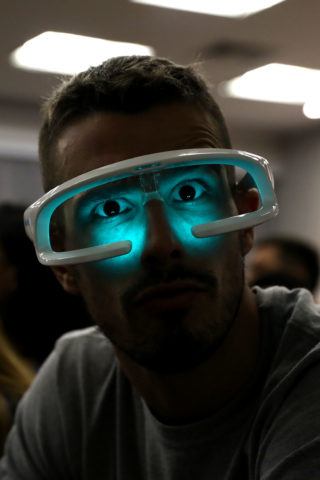
Bruno Fratus. Aclimatacao da selecao brasileira de natacao, estimulo luninoso. 24 de Julho de 2016, Sao Paulo, SP, Brasil. Foto: Satiro Sodré/SSPress/CBDA
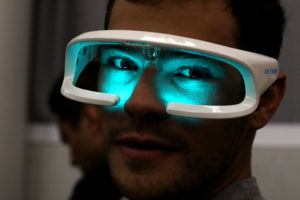
Marcelo Chierighini. Aclimatacao da selecao brasileira de natacao, estimulo luninoso. 24 de Julho de 2016, Sao Paulo, SP, Brasil. Foto: Satiro Sodré/SSPress/CBDA
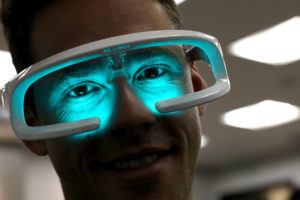
Thiago Pereira. Aclimatacao da selecao brasileira de natacao, estimulo luninoso. 24 de Julho de 2016, Sao Paulo, SP, Brasil. Foto: Satiro Sodré/SSPress/CBDA
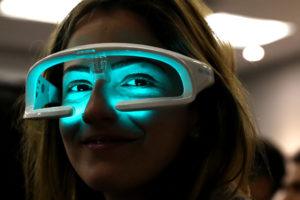
Gabriela Roncatto. Aclimatacao da selecao brasileira de natacao, estimulo luninoso. 24 de Julho de 2016, Sao Paulo, SP, Brasil. Foto: Satiro Sodré/SSPress/CBDA
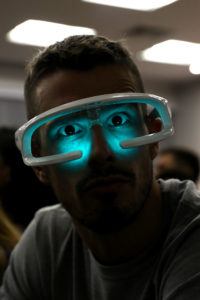
Bruno Fratus. Aclimatacao da selecao brasileira de natacao, estimulo luninoso. 24 de Julho de 2016, Sao Paulo, SP, Brasil. Foto: Satiro Sodré/SSPress/CBDA
I found Dory🤓😂😎 #justkeepswimming Deze lichtbril helpt me, met nu weer alle lampen aan, om in het Rio ritme te komen pic.twitter.com/BESJ2lxCC4
— Ranomi Kromowidjojo (@ranomikromo) July 25, 2016

The lightglasses used by the Australian Dolphins are called PROPEAQ and can be purchased via http://www.propeaq.com Besides the bluish LED light, PROPEAQ is also equipped with red lenses to mimic darkness and darkblue lenses to act as a normal sunglasses. An App tells you when to use the different features.
Theg should have had glasses that blocked out 100% of Manchester in 2012.. Or with rose coloured lenses that tricked the brain intothe thinking they were sent somewhere in the top 5000 cities .
Not surprisingly some arranged their own personal Manchexit .
Team management is critical – exceptionally so – at every major games but at these Olympics, it will be even more so.
Rio is chaotic when things are good. Right now, the place is a borderline disaster. Roads are broken, communications infrastructure is poor, there are security concerns, etc. The team managers that are best able to mitigate and control these external factors are going to play a huge role on how well their team does.
Curious as to how teams secure such locations in the athletes village? (top floor next to dining)
I have no idea how the village works, but if countries get their own building (if their delegation is big enough), maybe Australia is putting their swimmers in the best spots (on the top floor).
I read a while ago that the larger teams with hundreds of athletes and officials (ie. USA, China, Russia, GBR etc and Australia is likely also) will have their own apartment buildings. And then it is up to each national committee to set their own room arrangement.
Makes sense. The swimmers from smaller countries should have been offered a shared dorm however.
no proof they are any better than simply spending a week or 2 to adjust
Someone hack those so they’re always set for like, noon.
Australia is miles ahead of everybody else about technology in swimming overall.
I think they are just taller.